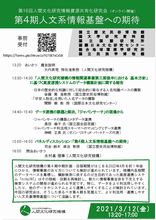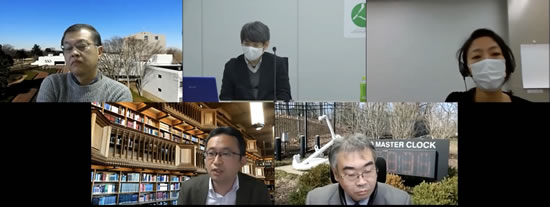Hopes for the Fourth Mid-Term Humanities Resource Infrastructure

Operated by the National Institutes for the Humanities (NIHU), “nihuINT” is an advanced data coordination system through which users can, in a single step, cross-search various databases that the six research institutes that make up NIHU have developed and released. “Cross-search” systems are common today and omnipresent online in various iterations. But nihuINT was quite a novel undertaking when NIHU publicly launched it back in 2008. As a system to support NIHU’s Resource Sharing Promotion Project, nihuINT went on to interconnect with databases offered by the National Diet Library and the Center for Southeast Asian Studies, Kyoto University. Adding myriad search and display functions from this coordination, nihuINT developed into a system that can search across more than 170 databases and contains over 5.5 million items of data.
August 2020 saw the official launch of “Japan Search,” an interdisciplinary and integrated portal site operated by the National Diet Library of Japan. Users can search through databases of various institutions in a single step, and NIHU, too, currently contributes more than 40 sources to the site. The advent of this portal site brings to the fore the dramatic change that the environment surrounding resources underwent over the past 13 years, and the need for NIHU’s upcoming fourth term of its information-related projects—kicking off in April 2022—to cope with that change.
Internal discussions are ongoing at NIHU for the blueprint of our fourth-term information-related projects. To exchange views with many different people, NIHU virtually hosted the “16th Resource Sharing Promotion Project Committee, National Institutes for the Humanities” on March 12, 2021. The event consisted of three segments.
The first segment shared reports on a plan about developing an advanced coordination system based on the “Basic Policy for the Latter Half of the Third NIHU Information-Related Project Term.” Eyeing the fourth term that starts April 2022, NIHU established this basic policy concerning what the information-related projects should address during the second half of its third term—that is during FY2021. Items highlighted in the policy referred to further coordination of research resources and knowledge, and in turn enabling users to apply data in more intricate ways. Under the policy, NIHU internally solicited suggestions on approaches to developing data infrastructure in a manner that aligns with this goal. Associate Professor Makoto Gotō, National Museum of Japanese History, and Professor Tatsuki Sekino, International Research Center for Japanese Studies, reported on the two proposals that were accordingly accepted during this fiscal year. Their presentations both happened to revolve around developing datasets that contain names of people and setting them as a foundation to coordinate with other datasets.
The second segment was titled “Data Coordination: Its Challenges and Resolution, Reported from the Frontlines of ‘Japan Search.’” Presenters in this section were Tomoko Okuda, who works on the JPS-RDF schema of Japan Search at the National Diet Library, and Masahide Kanzaki, representative of Xenon Limited Partners, a specialist of the Semantic Web and one who has been much involved in Japan Search from its conceptual stage. As mentioned earlier, NIHU currently provides over 40 databases to the August 2020-launched portal site. But the site runs also by accepting myriad other datasets from different disciplines and institutions. How the developers of Japan Search overcame the various roadblocks that must have emerged along the way and what kind of coordination is specifically possible with the site were some topics discussed in this block. The dialogue was very informative and potentially helpful in envisioning the future of NIHU’s resource infrastructure.
The theme of the final segment was “Hopes for the Fourth-Term Humanities Resource Infrastructure.” Presenters engaged in a panel discussion, with Professor Takuji Suzuki, National Museum of Japanese History, serving as moderator. Reflecting upon the trends observed within Japan Search, the speakers discussed how NIHU should develop and release further datasets.
This committee had never been hosted virtually in its previous 15 sessions. Since organizers had to prepare while observing the results of internal discussions about NIHU’s information-related projects, the announcement for the event came at short notice. We nevertheless gathered a considerable audience and had questions for the presenters. Establishment of NIHU’s infrastructure for its fourth-term information-related projects will greatly benefit from the discussions. There is much to look forward to in future NIHU information-related projects.
The proceedings of the committee have been made publicly available on the NIHU YouTube channel.

Presenters interacting in the panel discussion during the third segment. Clockwise from the top left: Professor Takuji Suzuki, National Museum of Japanese History; Project Associate Professor Hidenori Ōuchi, Center for Information and Public Relations, NIHU; Tomoko Okuda, National Diet Library; Professor Tatsuki Sekino, International Research Center for Japanese Studies; and Associate Professor Makoto Gotō, National Museum of Japanese History.
Text: Hidenori Ōuchi, Center for Information and Public Relations Project Associate Professor
